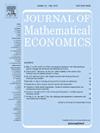Efficient reallocation of indivisible resources: Pair-efficiency versus Pareto-efficiency
IF 0.7
4区 经济学
Q3 ECONOMICS
引用次数: 0
Abstract
In the object reallocation problem, achieving Pareto-efficiency is desirable, but may be too demanding for implementation purposes. In contrast, pair-efficiency, which is the minimal efficiency requirement, is more suitable. Despite being a significant relaxation, however, pair-efficiency ensures Pareto-efficiency for any strategy-proof and individually rational rule when agents’ preferences are unrestricted.
What if agents’ preferences have specific restricted structures, such as single-peakedness or single-dippedness? We often encounter such situations in real-world scenarios. This study aims to investigate whether pair-efficiency is sufficient to ensure Pareto-efficiency in such cases.
Our main contribution in this paper is establishing the equivalence between pair-efficiency and Pareto-efficiency when dealing with single-peaked or single-dipped preference profiles. This equivalence holds without needing to assume any other properties of the rule. We further show that both the single-peaked domain and the single-dipped domain are the “maximal” domains where this equivalence holds.
不可分割资源的有效再分配:配对效率与帕累托效率
在对象再分配问题中,实现帕累托效率是可取的,但对于实现目的来说可能要求过高。相比之下,作为最低效率要求的成对效率更为合适。然而,尽管这是一个重大的放松,但当代理人的偏好不受限制时,配对效率确保了任何策略证明和个体理性规则的帕累托效率。如果主体的偏好具有特定的受限结构,比如单峰性或单倾性呢?在现实世界中,我们经常会遇到这样的情况。本研究旨在探讨在这种情况下,配对效率是否足以保证帕累托效率。我们在本文中的主要贡献是在处理单峰或单倾角偏好曲线时,建立了配对效率和帕累托效率之间的等价关系。这个等价成立,而不需要假定规则的任何其他属性。我们进一步证明了单峰域和单倾角域都是这个等价成立的“极大”域。
本文章由计算机程序翻译,如有差异,请以英文原文为准。
求助全文
约1分钟内获得全文
求助全文
来源期刊

Journal of Mathematical Economics
管理科学-数学跨学科应用
CiteScore
1.70
自引率
7.70%
发文量
73
审稿时长
12.5 weeks
期刊介绍:
The primary objective of the Journal is to provide a forum for work in economic theory which expresses economic ideas using formal mathematical reasoning. For work to add to this primary objective, it is not sufficient that the mathematical reasoning be new and correct. The work must have real economic content. The economic ideas must be interesting and important. These ideas may pertain to any field of economics or any school of economic thought.
 求助内容:
求助内容: 应助结果提醒方式:
应助结果提醒方式:


